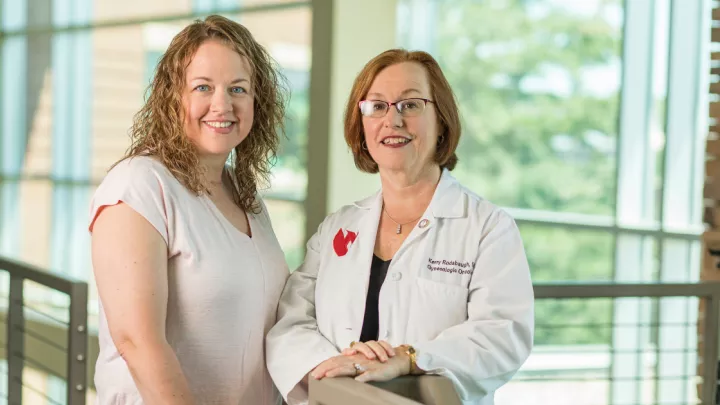What is a gynecologic oncologist and what do they treat?

A gynecologic oncologist is a physician trained in obstetrics and gynecology. They also have specialized training in gynecologic oncology.
Gynecologic oncologists treat patients with cancer of the:
- Uterus
- Cervix
- Fallopian tubes
- Ovaries
- Peritoneum (lining of the abdominal cavity)
These cancers are often first diagnosed by a patient’s obstetrician-gynecologist, or OB-GYN. Patients may then be referred to a gynecologic oncologist for further treatment.
What types of cancer do gynecologic oncologists treat?
Uterine cancer
The most common condition that gynecologic oncologists treat is uterine cancer. Treatment may include a hysterectomy, which is surgery to remove the uterus.
Endometrial cancer
One of the primary symptoms of endometrial cancer is abnormal bleeding. Spotting or bleeding after menopause can be a sign of cancer or pre-cancer.
“We work closely with general OB-GYNs, especially when a patient has abnormal bleeding,” says gynecologic oncologist Lindsey McAlarnen, MD. “If cancer is found, the patient may be referred to us for further treatment.”
Ovarian cancer
Often, ovarian cancer isn’t found until later stages because symptoms are less noticeable. Ovarian cancer may be discovered in imaging scans ordered to evaluate symptoms or after a risk-reducing surgery.
“Because we treat female cancers, we see patients with a strong family history of breast or ovarian cancer,” says Dr. McAlarnen. “If a patient has had genetic testing, they may be considering surgery to reduce their cancer risk.”
There are various treatments for ovarian cancer, depending on the stage. The most common is chemotherapy. Oral anti-cancer drugs may be given following chemotherapy for maintenance therapy.
Cervical cancer
Early detection of cervical cancer can save a patient’s life. If an abnormality is found on a pap smear, further tests will be done. The goal is to detect and remove precancers before they progress to cancers of the cervix. Treatment for cervical cancer may include surgery, radiation or chemotherapy.
“Cervical cancer is most often caused by the human papillomavirus, or HPV,” explains Dr. McAlarnen. “Because of this, I strongly encourage parents to vaccinate their children. Adults less than 45 years of age should also get vaccinated for HPV.”
What treatments do gynecologic oncologists provide?
Gynecologic cancers often involve very complex surgeries. Studies have shown that patients treated by gynecologic oncologists have the highest survival rates. Because they perform these surgeries regularly, these specialists are experienced in using the latest techniques to provide the best possible outcomes for patients.
Treatments provided by gynecologic oncologists include:
- Surgery – Common surgeries include hysterectomies (removing the uterus and cervix) and staging surgeries to discover the amount and location of cancer present.
- Radiation therapy—administered in conjunction with radiation oncologists—uses high doses of radiation to kill cancer cells and shrink tumors.
- Chemotherapy is a drug that uses powerful chemicals to kill fast-growing cells in your body.
- Immunotherapy and targeted therapies are becoming more available to treat molecular abnormalities of cancer.
What should I expect during my visit?
“When I see a patient for the first time, I will ask what brought them in to see me. I’ll also ask about their family medical history,” explains Dr. McAlarnen. “Next, I’ll do a thorough examination, including an abdominal and pelvic exam. During this exam, I’ll often be able to feel pelvic structures or an unwanted mass and get a better idea of what needs to be done surgically to remove it.”
Questions to ask your gynecologic oncologist:
- Are there any specific tests that can be done on my tumor? This is an important question to ask, as specific tests can be used to provide more personalized treatments.
- Are there any research opportunities or clinical trials I can participate in? While we often think of drug-related clinical trials, donating pieces of a tumor after surgery, which would otherwise be discarded, is also essential to cancer research.
What if I don’t have a gynecologic oncologist in my community?
Nebraska Medicine’s gynecologic oncologists often partner with a patient’s OB-GYN or medical oncology team at home. “Often patients will travel to us for a specific treatment or surgery while receiving ongoing care and treatments like chemotherapy closer to home,” explains Dr. McAlarnen. “This partnership allows patients to take advantage of the specialized care gynecologic oncologists provide while staying close to home for most of their treatment.”
If you’ve been diagnosed with cancer or precancer, your doctor can refer you to a member of our gynecologic oncology team. You can also call 800.922.0000 to schedule an appointment.







